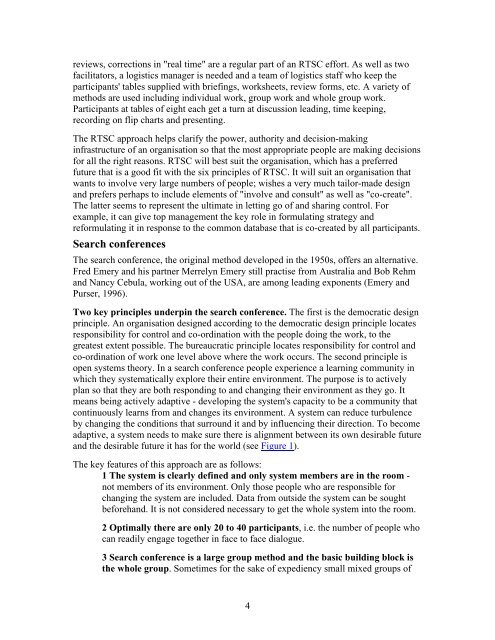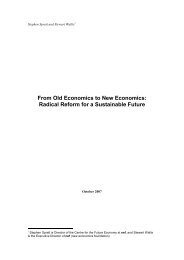Creating the futures we desire - getting the whole ... - Bruce Nixon
Creating the futures we desire - getting the whole ... - Bruce Nixon
Creating the futures we desire - getting the whole ... - Bruce Nixon
Create successful ePaper yourself
Turn your PDF publications into a flip-book with our unique Google optimized e-Paper software.
eviews, corrections in "real time" are a regular part of an RTSC effort. As <strong>we</strong>ll as two<br />
facilitators, a logistics manager is needed and a team of logistics staff who keep <strong>the</strong><br />
participants' tables supplied with briefings, worksheets, review forms, etc. A variety of<br />
methods are used including individual work, group work and <strong>whole</strong> group work.<br />
Participants at tables of eight each get a turn at discussion leading, time keeping,<br />
recording on flip charts and presenting.<br />
The RTSC approach helps clarify <strong>the</strong> po<strong>we</strong>r, authority and decision-making<br />
infrastructure of an organisation so that <strong>the</strong> most appropriate people are making decisions<br />
for all <strong>the</strong> right reasons. RTSC will best suit <strong>the</strong> organisation, which has a preferred<br />
future that is a good fit with <strong>the</strong> six principles of RTSC. It will suit an organisation that<br />
wants to involve very large numbers of people; wishes a very much tailor-made design<br />
and prefers perhaps to include elements of "involve and consult" as <strong>we</strong>ll as "co-create".<br />
The latter seems to represent <strong>the</strong> ultimate in letting go of and sharing control. For<br />
example, it can give top management <strong>the</strong> key role in formulating strategy and<br />
reformulating it in response to <strong>the</strong> common database that is co-created by all participants.<br />
Search conferences<br />
The search conference, <strong>the</strong> original method developed in <strong>the</strong> 1950s, offers an alternative.<br />
Fred Emery and his partner Merrelyn Emery still practise from Australia and Bob Rehm<br />
and Nancy Cebula, working out of <strong>the</strong> USA, are among leading exponents (Emery and<br />
Purser, 1996).<br />
Two key principles underpin <strong>the</strong> search conference. The first is <strong>the</strong> democratic design<br />
principle. An organisation designed according to <strong>the</strong> democratic design principle locates<br />
responsibility for control and co-ordination with <strong>the</strong> people doing <strong>the</strong> work, to <strong>the</strong><br />
greatest extent possible. The bureaucratic principle locates responsibility for control and<br />
co-ordination of work one level above where <strong>the</strong> work occurs. The second principle is<br />
open systems <strong>the</strong>ory. In a search conference people experience a learning community in<br />
which <strong>the</strong>y systematically explore <strong>the</strong>ir entire environment. The purpose is to actively<br />
plan so that <strong>the</strong>y are both responding to and changing <strong>the</strong>ir environment as <strong>the</strong>y go. It<br />
means being actively adaptive - developing <strong>the</strong> system's capacity to be a community that<br />
continuously learns from and changes its environment. A system can reduce turbulence<br />
by changing <strong>the</strong> conditions that surround it and by influencing <strong>the</strong>ir direction. To become<br />
adaptive, a system needs to make sure <strong>the</strong>re is alignment bet<strong>we</strong>en its own desirable future<br />
and <strong>the</strong> desirable future it has for <strong>the</strong> world (see Figure 1).<br />
The key features of this approach are as follows:<br />
1 The system is clearly defined and only system members are in <strong>the</strong> room -<br />
not members of its environment. Only those people who are responsible for<br />
changing <strong>the</strong> system are included. Data from outside <strong>the</strong> system can be sought<br />
beforehand. It is not considered necessary to get <strong>the</strong> <strong>whole</strong> system into <strong>the</strong> room.<br />
2 Optimally <strong>the</strong>re are only 20 to 40 participants, i.e. <strong>the</strong> number of people who<br />
can readily engage toge<strong>the</strong>r in face to face dialogue.<br />
3 Search conference is a large group method and <strong>the</strong> basic building block is<br />
<strong>the</strong> <strong>whole</strong> group. Sometimes for <strong>the</strong> sake of expediency small mixed groups of<br />
4



